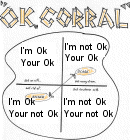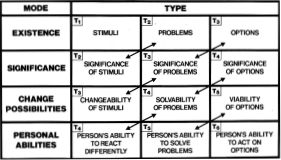Transactional Analysis
Eric Berne a medical doctor and psychiatrist created TA in the 1950s. The most popular known books were "Games people Play" and "I'm Ok your Ok". TA is not an independent field of study. TA was and is an umbrella for the vast works of people who pioneered psychoanalysis and the understanding of human psychology.

Erick Berne's exceptional skill was to select the most inspirational material from the research that had and was being done at the time. He then re-presented these works in a practical and structured manner to give the best understanding of how people are psychologically structured. This also included professional training support to enable psychiatrists and psychologists to practice excellence in therapeutic counselling. TA can be accredited for having a direct influence on transforming the psychological and psychiatric professions in bringing about compassionate understanding and caring for those who were deemed insane.
TA subjects
The total number of subjects within TA is so comprehensive that it requires at least 2 years of commitment and study for those who already have a humanities background. The TA material is grouped into 3 fundamental sections.
- Structural Analysis - describes psychological development from birth.
- Transactional Analysis - describes communication using the PAC model.
- Script Analysis - describes the scripts and life programs people follow.
Ego states
TA is recognised by the unique P.A.C. model Eric Byrne created which was based on the notion that each person is made up of 3 primary parts, represented as ego states. Byrne's versions of ego states were in addition to the Freudian psyche states Id, Ego, Super-ego and not intended as replacements.
Berne's PAC ego states represent how a person evolves from birth and develops into adulthood. The theory being that each state adds and not replaces the previous state so that when a person has reached maturity all 3 states are operative, hopefully in a positive manner. A popular use of the PAC model also demonstrates how people communicate from each of their ego states.

- Parent (structure and discipline)
- Adult (logical and pragmatic)
- Child (emotional and needs)
The right pic shows the child state of one person asking the parent state of the second person for an ice cream. The second person responds from their adult state to the adult state of the first person. For those studying TA for counselling application, this simple PAC model is extended to include complex and problematical communications between people in relationships.
Drama triangle
 Another popular TA model is the
Karpman Drama Triangle
based on Eric Byrne's book
'Games People Play'
and
Claude Steiner's
books 'Games Alcoholics Play' and 'Scripts People Live'. These writings give insights into the behaviour of co-dependence within families, marriages and addiction. The Drama triangle is also reflected in many television soap operas and demonstrates how individuals' endlessly rotate positions between Persecutor, Rescuer and Victim, which never resolve. An excellent film with Elizabeth Taylor and Richard Burton based on a play by Edward Albee
'Who's Afraid of Virginia Woolf'
is essential viewing and reading.
Another popular TA model is the
Karpman Drama Triangle
based on Eric Byrne's book
'Games People Play'
and
Claude Steiner's
books 'Games Alcoholics Play' and 'Scripts People Live'. These writings give insights into the behaviour of co-dependence within families, marriages and addiction. The Drama triangle is also reflected in many television soap operas and demonstrates how individuals' endlessly rotate positions between Persecutor, Rescuer and Victim, which never resolve. An excellent film with Elizabeth Taylor and Richard Burton based on a play by Edward Albee
'Who's Afraid of Virginia Woolf'
is essential viewing and reading.
Imprinting
Understanding and dealing with psychological imprinting from early childhood is the primary foundation upon which the TA subjects and counselling techniques are based. During the early development of modern psychology observations were made, that were counter intuitive, showed that children who had consistent human contact, well cared for or abused, had a greater chance of survival than an isolated child deprived of human contact.
Stroking
 Through the use of simple child-like graphic analogies, the complexities of imprinting are revealed. The right pic shows stroking as being any unit of recognition, positive or negative, verbal or non-verbal that addresses a child's existence. Once imprinted the child will un-consciously adjust its behaviour (throughout life) to elicit those type of strokes that were originally available regardless of moral interpretation. As an example, a child imprinted with physical or psychological abuse does not necessarily mean that as an adult he/she will abuse others but, there is a disproportionally higher chance that as an adult they will find themselves in situations that will elicit similar experiences confirming their childhood experience and un-consciously ignore experiences that do not.
Through the use of simple child-like graphic analogies, the complexities of imprinting are revealed. The right pic shows stroking as being any unit of recognition, positive or negative, verbal or non-verbal that addresses a child's existence. Once imprinted the child will un-consciously adjust its behaviour (throughout life) to elicit those type of strokes that were originally available regardless of moral interpretation. As an example, a child imprinted with physical or psychological abuse does not necessarily mean that as an adult he/she will abuse others but, there is a disproportionally higher chance that as an adult they will find themselves in situations that will elicit similar experiences confirming their childhood experience and un-consciously ignore experiences that do not.
A secondary form of imprinting as injunctions is imposed on all of us, enforcing us to adapt within a family and social context. Not all injunctions are psychologically harmful, toilet training, being appropriately dressed and not being dis-respectful of elders etc. The 10 commandments of Christianity can also be viewed as positive injunctions. However, not being allowed to express ones natural feelings, or being allowed to trust or be close to others, or not being allowed to express a natural talent for music, art or intelligence, or not being allowed to make a mistake. These negative injunctions can be psychologically harmful.
The imaginary fantasies of children provide an escape within the symbolism of characters in fairy tales, books and films. Imaginary escape from negative injunction also becomes a form of imprinting that continues into adulthood. We sometimes un-consciously arrange our adult world to abstractly resemble our imaginary childhood world without realising it. Identifying with Cinderella as an escape in childhood can inadvertently carry through into adulthood by continuously waiting for a Prince, that does not exist and no real man can match.
OK corral
 The resultant outcome from the complexities of early imprinting gives us an experience of our life script and life position, as a generalised feeling of being Ok or not Ok throughout our life. A feeling of beauty about ourselves and the world is a projected ideal we all wish for. Our relative feeling of Ok-ness is by comparison to our early imagined position of relationships with family, siblings and the larger community. The majority of us have an underlying experience of fearfulness of life as a result of feeling not Ok in comparison to others we perceive as being more Ok (I'm not Ok / Your Ok).
The resultant outcome from the complexities of early imprinting gives us an experience of our life script and life position, as a generalised feeling of being Ok or not Ok throughout our life. A feeling of beauty about ourselves and the world is a projected ideal we all wish for. Our relative feeling of Ok-ness is by comparison to our early imagined position of relationships with family, siblings and the larger community. The majority of us have an underlying experience of fearfulness of life as a result of feeling not Ok in comparison to others we perceive as being more Ok (I'm not Ok / Your Ok).
When we are angry at others and the world we may temporarily hold onto a position of feeling more Ok in comparison to others we perceive as being not Ok (I'm Ok / Your not Ok). We sometimes slip into depression from where we feel extremely not Ok and then perceive others and the world as the same (I'm not Ok / Your not Ok) with mixed combinations of anger, fear, grief and hopefulness. Many of the psychological social problems of emotional blockage, discounting, depression, alcoholism and addiction are the result of early imprinting.
Discounting

Discounting is a behaviour (often unconscious) enacted in many areas of life. Discounting is often enacted for the purpose of protection from negative childhood experiences being re-experienced in later life. But discounting has the inadvertent outcome of restricting learning and adapting to the adult world.
Hiding depression by being the life at the party or over active in sport. Unable to leave an abusive marriage or work environment because of fear of change. Trying to be stoic when having a physical illness and refusing medical attention. The list is endless. Psychologists with TA skills learn to recognise specific areas of discounting and are able to be effective in helping others.
Behind these examples is a vast body of work that is possibly the most extensive compilation of the study of human development and behaviour that has ever been undertaken. TA also incorporates the core principles of Analytical psychology (or Jungian psychology). Gestalt therapy co-founded by Fritz Perls, Laura Perls and Paul Goodman. Bioenergetics developed by Alexander Lowen based on the original works of William Reich and many more. Unfortunately TA subjects are rarely taught correctly to psychology students at universities leaving them with an incomplete understanding of the complexities they are about face in the real world, when assisting people who wish to resolve emotional and relationship difficulties.
TA and NLP overlap
The P.A.C. ego state model and Drama Triangle were sometimes mistaken to be literal, which was not the intent of Erick Byrne. He meant for these models to represent ideas that could be expanded. Another unfortunate loss was that the business management for TA studies became fragmented, limiting the ability to provide excellence in training for the psychology and psychiatric professions, that Berne had intended.
The new NLP linguistic based system with its VAK (Visual Auditory kinaesthetic) model revolutionised our approach to understanding the human cognitive process. The TA ego state model PAC (Parent Adult Child) was superseded by the NLP sensory V A K (Visual Auditory kinaesthetic) model, which led to the un-intended outcome for TA to be dropped from popular use. It can be argued that the TA and NLP models are complementary and should have been integrated to represent a larger picture of human understanding. The failure of this opportunity is an unfortunate loss to the field of psychology.

TA began from an egalitarian perspective in the 1950s and continued through the 1960s retaining its altruistic ideals. But, when NLP appeared during the 1980s, the social conditions had changed especially with corporate economic management and aggressive marketing. This new era of instant gratification has less time, passion or commitment to learn difficult subjects and skills for the benefit of serving others. NLP marketed itself targeting the new Self driven generation providing high speed training enabling those qualified to provide the quick fix and fast buck to consult and manage others.
Summary
Hopefully, a rationalisation of the TA and NLP subjects will eventually be integrated. There are many books within the TA umbrella that are of excellent value for all who are passionate about understanding who we are and the skills required to be of service to others.
TA Today Ian Stewart and Vann Joines
Scripts People Live Claude_Steiner
Games People Play Eric Berne
What do You Say After You Say Hello Eric Berne
Born to Win Muriel James & Dorothy Jongeward
TA for Tots Alvyn M. Freed
TA for Teens Alvyn M. Freed
Conjoint Family Therapy Virginia Satir
The Language of the Body Alexander Lowen
Function of the Orgasm Wilhelm Reich










wikipedia.org / Transactional analysis
Dr. Eric Berne
ITAA - International Transactional Analysis Association
WPATA - Western Pacific Association of Transactional Analysis
Claude Steiner
TA-TUTOR
wikipedia.org / Virginia Satir
Virginia Satir Global Network
The Alexander Lowen Foundation
wikipedia.org / Wilhelm Reich
The Wilhelm Reich Museum